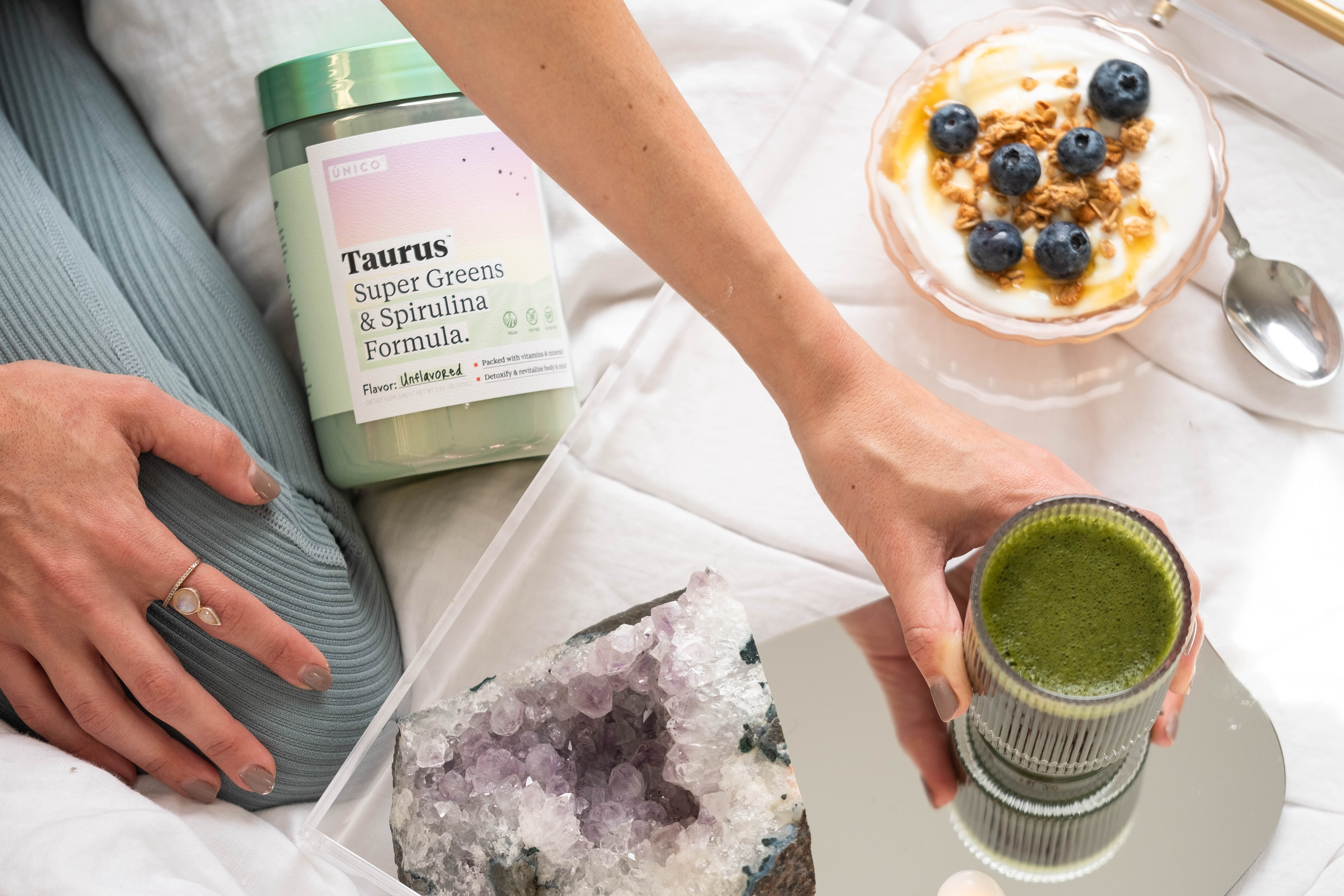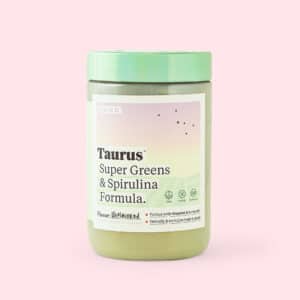Algae is an increasingly popular plant-based food and supplement in health and wellness. But are you familiar with the many benefits of algae, and why it is the next a sustainable superfood of the future?

All edible varieties of algae – regardless of shape, size, or color – are highly nutritious, and some of the most sustainable plants to produce in the entire world.
What is Algae?
Algae is an aquatic plant that grows in most fresh, and saltwater bodies across the world.
Some micro-algae species can alternatively be produced in a laboratory.
There are over 40,000 species of algae, and they range in size from microscopic micro-algae to giant kelp and seaweed plants!
Many species of algae are edible, and have been consumed for thousands of years by humans for their unique taste and nutritional benefits1.
There are four main groups of edible algae, which have been categorized by color1:
- Blue-green – Chlorella or spirulina
- Brown – Kelp, kombu wakame, and arame
- Green – Sea grapes and sea lettuce
- Red – Nori, dulse, and Irish moss
Regardless of color, all algae varieties contain many nutrients, such as vitamins, minerals, antioxidants, fiber, and protein.
The high nutrient value can contribute many benefits to your overall health, while reducing your overall carbon footprint.
What Makes Algae the ‘Sustainable Superfood’?
Algae is very likely to be the next big thing in superfoods, and there are some very compelling reasons why.
Similar to how adaptogens dominated many of the superfood conversations in the 2010s, algae is poised to do the same in 2020 and beyond.
Part of the reason why is that adding algae to your daily routine can lessen the environmental impact of your food and nutrition choices5.
These environmental benefits of algae come from being one of the most climate-conscious and sustainable foods to produce.
Compared to other land-based plants, algae5:
- Can grow up to ten times faster
- Uses fewer resources to cultivate and harvest (i.e., land, water, etc.)
- Sequesters carbon as it grows – aka: cleans the air by absorbing global-warming inducing carbon molecules
In addition, algae is a sustainable, vegan, and a potentially more potent source of omega-3 fatty acids than fish-derived omega-3s!
Omega-3s, But Without the Boats & Nets
Though servings of fish contain high amounts of these non-saturated fatty acids – essential for maintaining good heart and brain health – fish do not naturally produce omega-3s.
Instead, fish are high in this healthy fat because algae are their primary food sources5.
By consuming algae-derived omega-3s, less environmental impact occurs by avoiding the food chain and biodiversity disruption caused by fishing5.
There are many reasons to feel good about taking algae as
The Benefits of Algae as a Supplement
Algae is environmentally sustainable and can have immense benefits for your health due to its amazing nutrition content. You should know that algae are:
1. Highly nutritious
In most algae types, you will find complete proteins and omega-3 fatty acids1.
They also contain several B vitamins – B1, B2, and B3 – as well as copper, iron, and natural, plant-based chemicals known as phytonutrients 1.
2. Acts as an Antioxidant
Free radicals can cause oxidative damage to your DNA and cells that stimulate chronic inflammation2. This damage contributes to poor health and the development of disease.
There are several antioxidants found in algae, including:
- Vitamins C and E
- Carotenoids (i.e., beta-carotene, zeaxanthin, and neoxanthin)
- Chlorophylls
- Phenols
- Plant-derived chemicals and color pigments
Antioxidants are important for skin health, cardiovascular health, and keeping your immune system running strong.
3. May Improve Allergy Symptoms
If you suffer from the symptoms of allergic rhinitis – inflammation of your nasal passageways – algae may be able to help.
Common environmental allergens, such as pollen, animal hair, dust mites, or even saliva, can trigger allergy symptoms.
Some algae may ease allergen-caused symptoms, including nasal discharge, sneezing, nasal congestion, and itching due to their anti-inflammatory properties3.
4. Promotes Healthy Skin
The immuno-modulation benefits of algae also help in maintaining good skin health3.
As part of the immune system, the skin protects your body as the ‘first line of defense.’
This function makes the skin susceptible to inflammation and damage from long-term contact with environmental irritants.
Nutritional compounds – such as antioxidants and phytonutrients – in algae modulate these immune reactions, helping to hydrate skin, strengthen the skin barrier, and ease noticeable redness.
Recommended Reading: The Five Best Foods for Your Skin.
5. Enhances Natural Energy Levels
The micronutrient and unsaturated fat content in algae can also naturally enhance your daily energy levels4.
Vitamins B1 and B2 – also known as thiamin and riboflavin – and iron are involved in energy production, oxygen delivery, and maintaining your energy levels throughout the day.
Consuming more algae increases the amount of these micronutrients in your body and the body’s capacity to maintain adequate energy.
Recommended Reading: The Many Benefits of Folate (Vitamin B9)
In addition, omega-3s are used for energy throughout the body, but primarily in the brain.
Because algae contain a high amount of omega-3 fats, it can help improve energy and clarity, concentration, overall mood, and sleep quality.
6 Types of Algae that are Nutritious and Sustainable
Regardless of what type, algae is highly nutritious and one of the most sustainably produced plant-based foods available.
However, here are six of the most popular types of algae around the world and how they can benefit your health:
1. Spirulina
Spirulina is a type of blue-green algae – known as cyanobacteria – that you’ve likely heard of spirulina.
Due to its nutritional content and proven health benefits has become a trendy supplement over the past ten years.
Spirulina contains ample protein, B vitamins, iron, and the antioxidant pigment phycocyanin6.
Phycocyanin provides spirulina its trademark blue-green color along with its stress-fighting and anti-inflammatory benefits, which offers cardiovascular, immune, and allergy-related benefits.
You can easily find spirulina in powder or supplement form. Easily add the benefits of spirulina into:
- Smoothies
- Oatmeal
- Baked goods
- Soups or salads
Taurus Super Greens Formula

Taurus Super Greens Formula
Featuring 2000mg Parry Organic Spirulina per, a Nutrifusion vitamin blend, and full label transparency.
2. Kelp
Kelp is a large, brown seaweed found virtually anywhere along saltwater coasts.
However, many people don’t know that it is an edible, nutritious variety of algae.
Kelp contains notable amounts of vitamin K, folate, calcium, omega-3 fatty acids, and fiber7.
It also obtains carotenoids and flavonoids, which are antioxidant compounds.
Due to this algae’s high vitamin K and calcium content, consuming kelp can increase the health and strength of your bones.
Calcium is an essential component of bone structure, while vitamin K is involved in bone metabolism and calcium regulation.
In addition, the type of fiber found in kelp – known as alginate – is an impressive prebiotic.
It feeds beneficial bacteria of the gut microbiome to maintain good digestive health and other related body functions.
Prebiotic fiber, like that found in kelp, along with a good probiotic routine can help improve overall gut health.
3. Irish Moss
Irish moss – also known as sea moss or red seaweed – is red algae and spiny sea vegetable.
This moss also comes in other colors, including green, yellow, purple, brown, and black.
It is also an everyday nutritional supplement in the health industry.
While more research is needed around Irish moss’s health and nutrition benefits, the most notable nutrient in Irish moss is iron.
This algae contains 10% of the daily value, contributing to its potential to8:
- Support thyroid function
- Improved immune function
- Enhanced gut health
- Promoting heart health
- Maintaining blood sugar levels
4. Chlorella
Chlorella, a green algae grown in freshwater, is one of the most well-known varieties of algae – aside from spirulina – in the health industry.
Around 50-60% of chlorella’s total body weight is protein.
This protein is ‘complete,’ meaning it contains all nine essential amino acids the body cannot produce and must replenish via diet9.
It also contains high amounts of excellent iron, vitamin C, antioxidant compounds, fiber, and omega-3s.
Omega-3s are important for cognitive health, cardiovascular health, and is one of the top nutrients for improving overall mood.
One of the most popular benefits of chlorella is its ability to support liver function and reinforce the body’s natural detoxification processes.
5. Nori
Nori is another form of large seaweed that grows in bodies of saltwater, similar to kelp.
While the most commonly consumed type of nori is green, it also grows in dark purple and black varieties.
This algae contains a unique combination of nutrients, including high amounts of iodine, copper, fiber, and the amino acid tyrosine10.
Nori is most notably known for supporting gut and thyroid gland function.
Enjoy more nori in your daily diet by:
- Eating it in sushi rolls
- Use it as a ‘wrap’
- Add it as a topping or garnish
- Use it like any other vegetable
6. Lichen
Lichen – also called mossy fungus – is a complex organism formed through the symbiotic relationship between fungus and algae.
The algae found in lichens are typically green or blue-green cyanobacteria, similar to spirulina.
Lichen is a rich source of protein, iron, and antioxidant compounds, which may effectively promote heart health and maintain low blood sugar levels11.
Is Algae Safe for Everyone?
Algae is safe for most people to consume regularly.
However, algae contain high amounts of the mineral iodine, especially large seaweeds, like kelp and nori.
When consumed in excess, iodine can impact the function of the thyroid, unbalancing metabolism and hormone levels in the body.
If you have an iodine sensitivity, you will want to monitor your intake of algae or algae-derived supplements1.
Add More Algae to Your Sustainable Lifestyle
Whether you are a sustainable living expert or novice, algae is a great option to make your daily routine more environmentally friendly.
The benefits of algae will not only help you be a healthier version of yourself, but also help create a cleaner environment.
Try adding different algae varieties to meals and snacks or purchase a high-quality algae-containing supplements for a nutrient boost with a better impact on the earth.
Sources:
1 https://www.ncbi.nlm.nih.gov/pmc/articles/PMC5387034/
2 https://www.ncbi.nlm.nih.gov/pmc/articles/PMC5387034/
3 https://www.ncbi.nlm.nih.gov/pmc/articles/PMC5618288/
4 https://www.ncbi.nlm.nih.gov/pmc/articles/PMC5387034/
5 https://www.ncbi.nlm.nih.gov/pmc/articles/PMC3465194/
6 https://www.ncbi.nlm.nih.gov/pmc/articles/PMC5274660/
7 https://pubmed.ncbi.nlm.nih.gov/22054935/
8 https://www.ncbi.nlm.nih.gov/pmc/articles/PMC4413210/
9 https://www.ncbi.nlm.nih.gov/pmc/articles/PMC7551956/
10 https://www.ncbi.nlm.nih.gov/pmc/articles/PMC7345263/
11 https://www.ncbi.nlm.nih.gov/pmc/articles/PMC4838734/
Recommended Readfing:
- Does Protein Give You Energy? A Registered Dietitian Says ‘Yes’ - December 12, 2023
- Fast vs. Slow Digesting Proteins – Which is Better? - February 20, 2023
- The Top 7 Benefits of Algae – Meet the Sustainable Superfood of the Future - February 8, 2022
